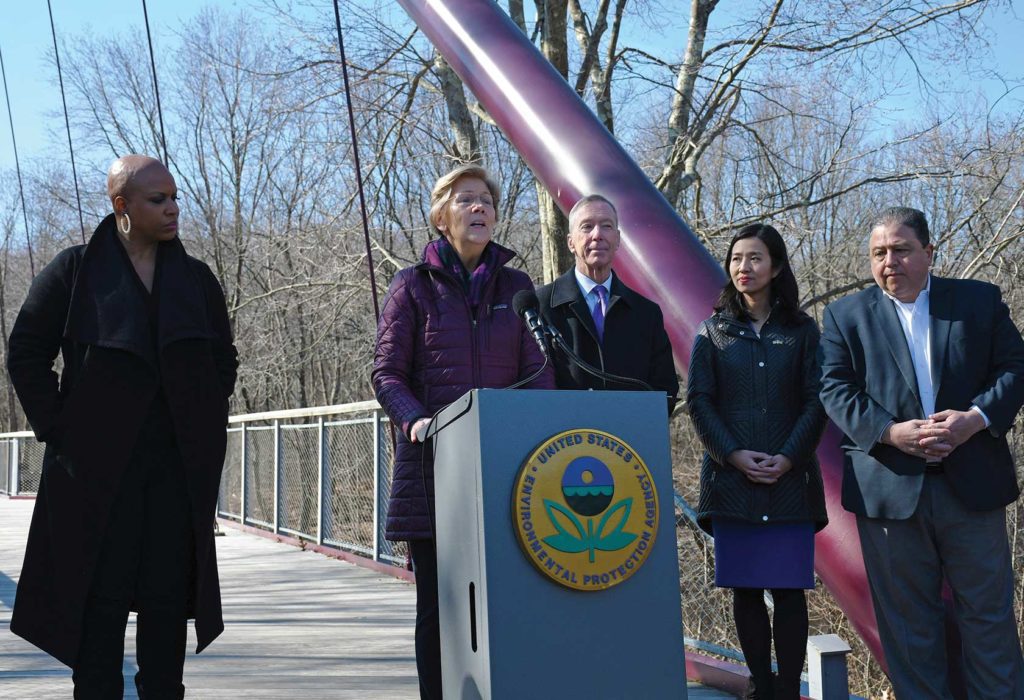Neponset designated Superfund site
Designation prioritizes river for federal funds

The Lower Neponset River has been designated by the Environmental Protection Agency (EPA) as a Superfund site, local officials announced Monday at a press conference in Mattapan. The addition of the 3.7-mile stretch of river — from its confluence with Mother Brook in Hyde Park to the Walter Baker Dam in Dorchester — to the EPA’s Superfund National Priorities List aims to better support cleaning and conservation efforts in the area.
“This is a win-win for the communities who value recreating on the river, families who live in the area and the wildlife that depend on it, because we now have a mechanism to address the contamination and the sediment that have plagued the river for decades,” said David Cash, New England regional administrator for the EPA.
The area has faced pollution from industrial use in its history is contaminated with polychlorinated biphenyls (PCB) — chemicals that were banned in the late 1970s due to their impacts on human and environmental health. Its addition to the Superfund National Priorities List will draw focus and attention from the EPA to better improve the conditions and contamination of the river.
“Today’s action will result in a transformation of the river, improving its ecological health and bringing big benefits to the communities that share the Neponset,” Cash said.
Congresswoman Ayanna Pressley said at the event that this action is an important step to reduce the harm that environmental racism has played in the area’s past. According to a 2020 report from the Shriver Center on Poverty Law, 70% of Superfund sites in the United States are within a mile of federally-assisted housing, which Pressley said indicates they pose heightened risk to Black, Brown and low-income populations.
“We know that to combat decades of environmental racism, we must prioritize environmental justice, which is intrinsically linked to racial, health and environmental justice,” Pressley said. “Now is the time … to advance bold policies and budgets to invest in our communities to undo decades of injustice and to affirm our fundamental right to drink clean water, to breathe clean air, and to live in clean and safe communities.”
To Mayor Michelle Wu, this action is important to help communities that have long borne the brunt of disinvestment.
“The communities that stand to benefit the most from our investments here are the communities that have been historically targeted for disinvestment, as part of racist policies like redlining, for decades,” Wu said. “While the few companies profited, our neighborhoods were polluted, and our residents paid the price with their health. Dangerous chemicals do not belong in our water, they do not belong in our communities.”
Wu said she is impressed by the many community members who have taken action to remove trash from the river or lead community meetings about cleaning the area.
“The neighbors and the communities have done their part for many, many years,” Wu said. “I’m so excited that now the public sector and our federal government and state and city, of course, will continue to be a full partner in that and be able to truly restore and invest in that.”
Federally, Congress has pushed to better address areas on the Superfund list. The bipartisan infrastructure law passed in November set aside $3.5 billion to help clean up Superfund sites. Warren said the funding is “one of the largest investments in American history to address the legacy of pollution that harms the health of our communities and neighborhoods.”
At the Lower Neponset site, Cash said the EPA can’t give a specific timeline on the project, as further initial investigation must be done regarding the extent of the contamination.
“We have some idea of what’s there, given the analysis that you’ve heard for 20-plus years it’s gone on,” Cash said. “We don’t know where, and we don’t know the extent, and that’s primarily what we’re looking to find.”
As they move through the process, Cash said they want to prioritize communication with the community, especially if the agency is planning to take actions that could look concerning or pose dangers to the community.
Ian Cooke, executive director of the Neponset River Watershed Association, said he is glad there seems to be agreement that this project shouldn’t be drawn out.
“I know my organization and many others — and I’m glad to hear many leaders on the stage saying this, this morning — are all going to work to try to make this a clean-up that takes years rather than decades,” Cooke said.
In the meantime, he said, community members shouldn’t refrain from using the green spaces around the river, walking or biking along the paths, or fishing in its waters — provided they don’t eat what they catch.
“You can still enjoy the river,” Cash said. “The Superfund name, I think, can be intimidating, but it’s still an important recreational resource, and hopefully in the next few years it will both be healthy for people and for wildlife, and we’ll really have the kind of urban river these neighborhoods need and deserve.”






